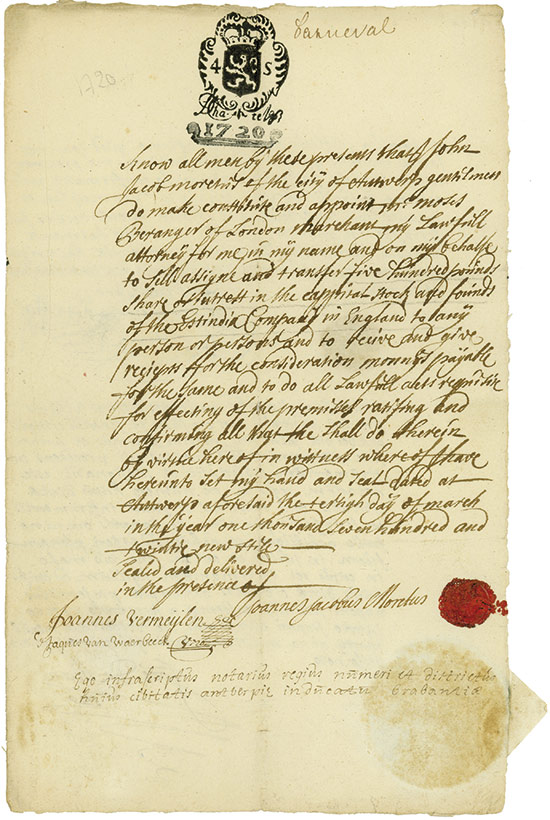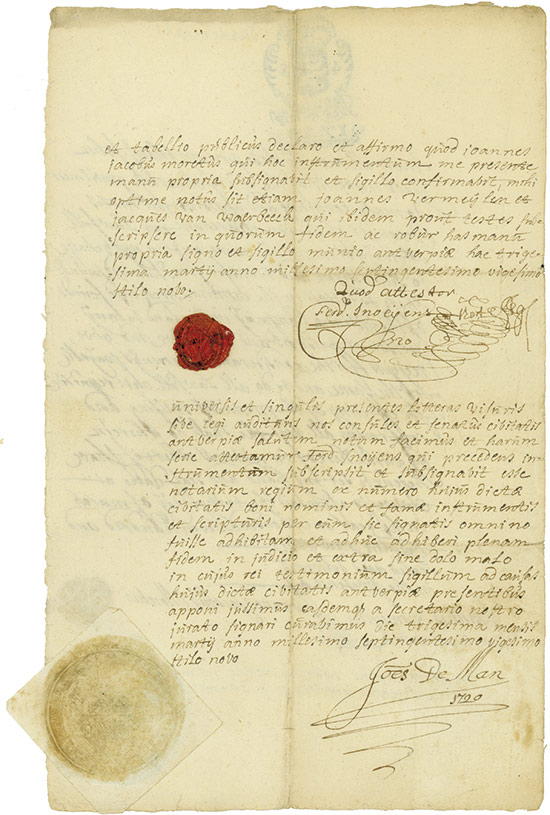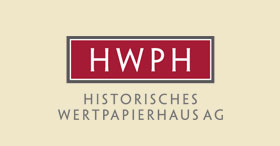Ingelsberg 17 b
D- 85604 Zorneding
Deutschland / Germany
Tel.: +49 (0)8106 - 2461-86
Fax: +49 (0)8106 - 2461-88
E-Mail: auktion@hwph.de
HWPH Historisches Wertpapierhaus AG –
Wasz specjalista w zakresie historycznych
papierów wartościowych i historii finansjery
|
||||
Numer |
531 | |||
Tytuł |
East-India Company | |||
Miejscowość(i) |
||||
Kraj |
Großbritannien, Indien | |||
Region |
Europa | |||
Opis |
März 1720, Power of Attorney by Johannes Jacobus Morebis (?) of the city of Antwerp appointing Moses Beranger of London, merchant, to sell £ 500 share in the capital stock of the English East-India Company, 31,6 x 19,5 cm, schwarz, beige, Knickfalten, Erhaltung VF, zwei Wachssiegel, handschriftlich, Rarität aus einer alten Sammlung. | |||
Opis (Angielski) |
March 1720, Power of Attorney by Johannes Jacobus Morebis (?) of the city of Antwerp appointing Moses Beranger of London, merchant, to sell £ 500 share in the capital stock of the English East-India Company, 31.6 x 19.5 cm, black, beige, handmade paper, folds, condition VF, two wax seals, handwritten, rarity from an old collection. | |||
Stan |
VF | |||
 |
||||

| ||||
Historia (Niemiecki) |
Nachdem die alten Handelsstraßen von Indien und dem Fernen Osten nach Europa von den Türken und Mongolen im 14. und 15. Jahrhundert blockiert wurden, mussten die Europäer einen Ausweg finden. Auf Veranlassung von Heinrich dem Seefahrer hat Vasco da Gama als erster Europäer Indien auf dem Seeweg über das Kap der guten Hoffnung erreicht. Nachdem sich die beiden großen Seefahrernationen Spanien und Portugal zusammengeschlossen hatten, gewann auch England unter Queen Elizabeth I. eine führende Position unter den Handelsmächten. Um diese auszubauen, privilegierte die Queen am 31.12.1600 die „Gesellschaft der Kaufleute, die mit Ost-Indien Handel treiben“. Das Unternehmen erhielt vorerst auf 15 Jahre das englische Handelsmonopol für Afrika, Asien und Amerika. Nachdem die Gesellschaft sehr erfolgreich war, wurde das Handelsmonopol bereits 1609 auf unbestimmte Zeit verlängert. Die folgenden Jahrzehnte waren gekennzeichnet von einem Kampf mit der Vereinigten Ostindischen Compagnie (V. O. C.) um die Vorherrschaft im Ostindienhandel. 1709 fusionierte die Gesellschaft mit einem Wettbewerber zur United Company of Merchants of England trading to the East Indies (E. I. C.). Im 18. Jahrhundert übernahm die Gesellschaft neben ihren Handelsaktivitäten auch die Verwaltung des indischen Subkontinents. Den Charakter einer kommerziellen Gesellschaft verlor die East-India 1834 durch ein Gesetz. Fortan arbeitete sie nur noch als Agentur für die britische Regierung. 1858 übernahm die Regierung wieder die direkte Herrschaft über die Gesellschaft und über British India. Nach mehr als 270 Jahren wurde die Gesellschaft aufgelöst. | |||
Historia (Angielski) |
After the old trade routes from India and the Far East to Europe were blocked by the Turks and Mongols in the 14th and 15th centuries the Europeans had to find alternatives. At the instigation of Henry the Navigator, Vasco da Gama became the first European reaching India by sailing round the Cape of Good Hope. With the coalition of Spain and Portugal, the two biggest seafaring nations at that time, England also increased its trading power. As Queen Elizabeth I intended to strengthen England’s position she granted a charter to the “Company of Merchants of London trading into the East Indies” on 31 December 1600. The company held the English trade monopoly in Africa, Asia and America at first for 15 years. As the business was already very successful, in 1609 the monopoly was extended indefinitely. The next decades were marked by fighting against the Dutch East India Company (V.O.C.) for the hegemony in trading with the East Indies. In 1709 the company merged with an upstart competitor to form the United Company of Merchants of England trading to the East Indies (E.I.C.) In the 18th century besides trading the E.I.C. had its own army and in the 1750s defeated large forces of Indian and French troops. The company assumed the administration of the major part of the Indian subcontinent. In 1834 the company lost its commercial character by law. From this time on, it was an agency of the British government only. 24 years later, 1858, after a major Indian mutiny, the government took over the direct control of the company and of British India. The E.I.C. was dissolved in 1874 after more than 270 years. | |||
Proszę zwrócić uwagę także na topowe egzemplarze tej aukcji: |
||||













